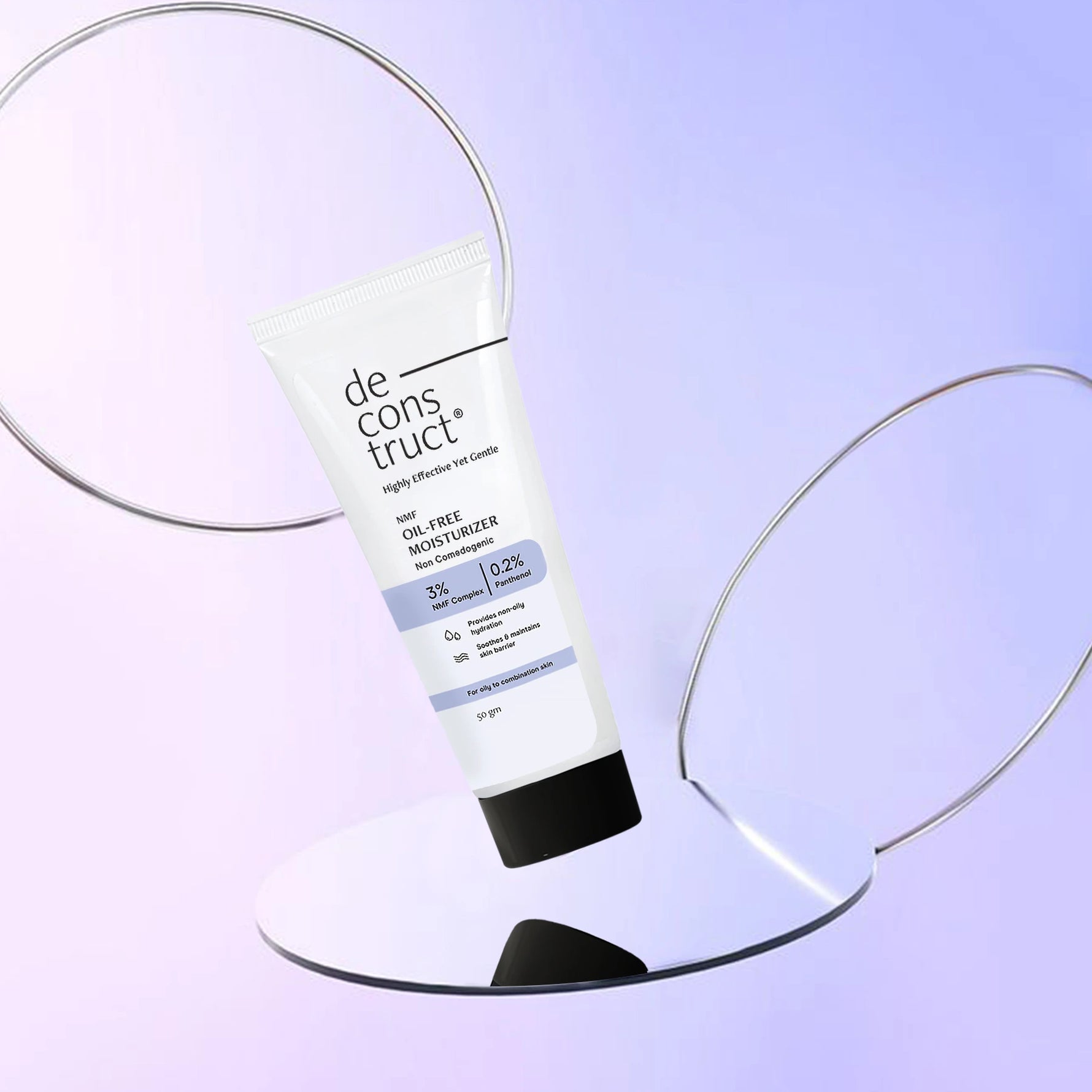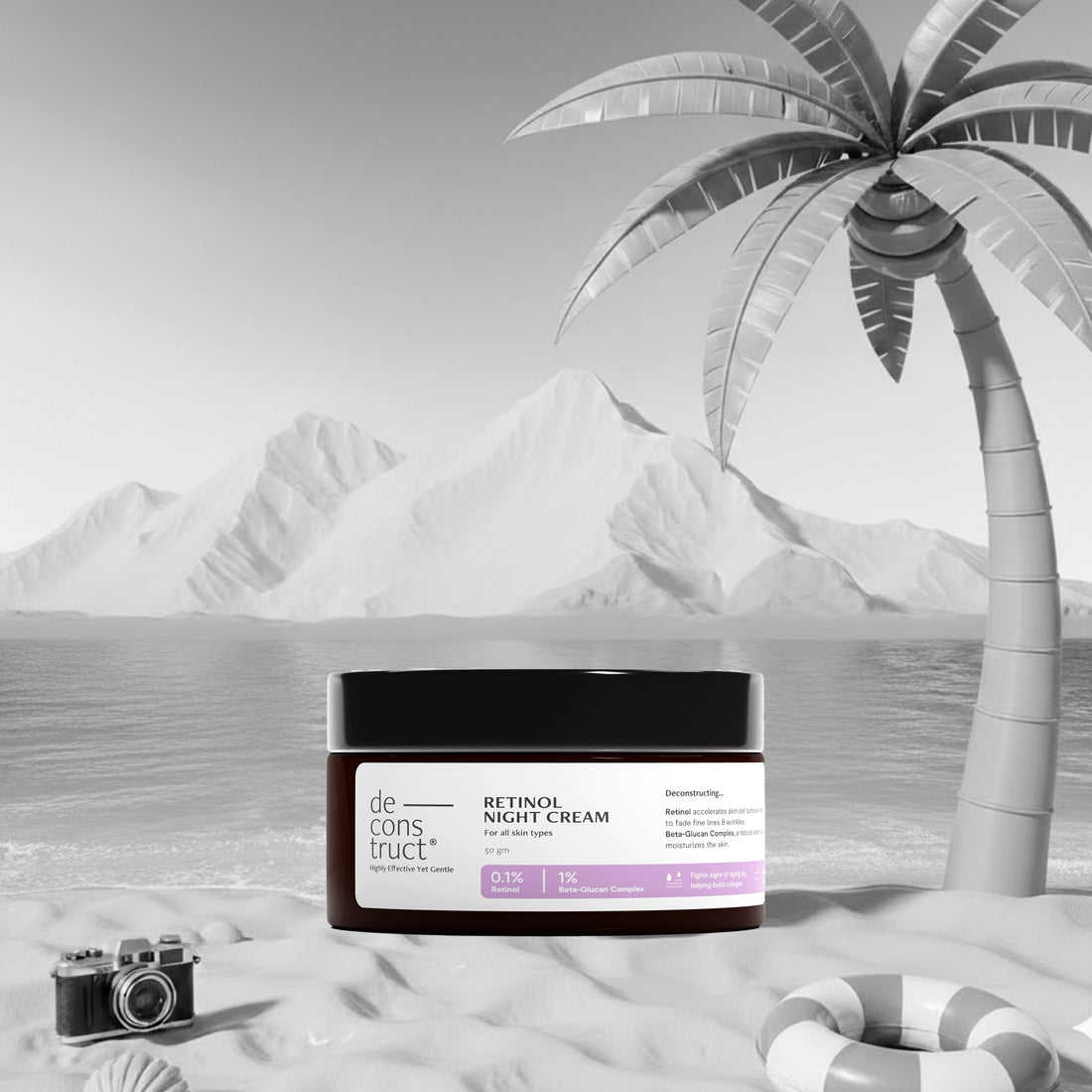Why Oil-Free Moisturizers Matter for Oily Skin
If you have oily or acne-prone skin, you might believe that skipping moisturizer or using oil-control serums is the best course of action. But that’s a myth. In fact, hydration still matters even when sebum production is high.

Deconstruct — Oil-free Moisturizer for Oily Skin
“Oil-free” doesn’t mean “no moisture.” It simply means a moisturizer that does its job without adding excess oils that can weigh down or clog pores. Using a proper oil-free moisturizer helps maintain your skin barrier, prevent excessive oil compensation, and keep your complexion balanced.
In this guide we will dive into what an oil-free moisturizer is, who it benefits and also suggest dermatologist insights on the subject.
What Is an Oil-Free Moisturizer?
An oil-free moisturizer is a hydrating product formulated with minimal emollient oils, designed for skin types that tend to generate more sebum or get clogged easily.
How does this differ from a regular moisturizer? A regular moisturizer might include richer emollients and heavier occlusives (butters, oils) and be tailored for dry or normal skin. An oil-free moisturizer instead uses humectants (water-attracting ingredients like hyaluronic acid and squalane) and light emollients.
Oil-free formulas may also help regulate sebum since heavy occlusives can signal the skin to produce less water, which sometimes makes it produce more oil.
Is Oil-Free Moisturizer Good for Acne-Prone Skin?
Yes, acne-prone skin benefits from lightweight, non-comedogenic formulas that won’t block pores or sit heavily on top of skin. When you use an oil-free moisturizer for acne-prone skin, you’re reducing the risk that your moisturizer will become a contributing factor to breakouts.
“Non-comedogenic” means the product is formulated so as not to clog pores. Many oil-free options emphasize that. Products with a lightweight texture mean less buildup on the skin and less chance of clogged pores.
Look for dermatologist-recommended ingredients like niacinamide, salicylic acid, and aloe vera work together to soothe inflammation, control excess oil, and calm redness.
So in short: yes, oil-free moisturizer for acne-prone skin is a smart move, especially when you have other treatments in your routine (like salicylic acid, retinoids), because it supports the barrier without excess oil or heaviness.
Is Oil-Free Moisturizer Always Better for Oily Skin?
Oil-free moisturizers are not necessarily always better but are very helpful.
For oily skin, you definitely want the product layers to be lightweight and non-greasy. An “oil-free moisturizer benefits” list would include less heaviness, faster absorption, less shine, and less likelihood of pore-clogging.
Oil-free doesn’t automatically mean perfect for all oily skins. Some oily skin types might also benefit from gel-based or water-based moisturizers in humid climates which focus even more on hydration rather than oil control.
The difference between hydration and oil control is worth understanding. Hydration is the water content / moisture in your skin, but oil control is sebum production your skin signals to produce or how it behaves.
A good moisturizer addresses hydration without encouraging excess oil.
Should Oily Skin Types Use Moisturizer?
Absolutely yes. If you have oily skin, you might be tempted to skip moisturizer, thinking oily skin doesn’t need it. That’s a common mistake.
Your skin has a barrier and regulatory system. If you skip moisturizer, your skin may experience slight dehydration, triggering signals for more sebum production to compensate, which leads to even more oil.
Plus, a balanced barrier helps your skin respond better to acne treatments and environmental stressors.
After all, hydration doesn’t equal oil. Moisturizing oily skin means giving the skin water-based support and barrier-care, not adding heavy oils.
What Happens If You Skip Moisturizer Because of Oily Skin?
If you skip moisturizer, you might inadvertently trigger:
-
More sebum production (because your skin senses dryness and overcompensates)
-
Dull, uneven texture (even oily skin can become dehydrated underneath the surface).
-
Irritation or sensitivity (without proper barrier support, treatments/cleansers may irritate your skin more).
-
More frequent breakouts (especially if oil production increases, plus you might over-wash, further destabilizing your barrier).
Here’s a simple skincare routine example you can follow:
Cleanse your face with a gentle cleanser, then follow up with a lightweight oil-free moisturizer after cleansing. You give your skin barrier support, your skin feels hydrated, and you don’t trigger over-production of oil in response.
Study by Flávio B Camargo Jr shows that formulations containing panthenol significantly improve skin hydration and reduce transepidermal water loss (TEWL), helping maintain barrier integrity even after cleansing-induced dryness.
A great dermatologist-recommended option is Deconstruct’s Oil-Free Moisturizer for Oily Skin, which contains a 3% NMF (Natural Moisturizing Factor) Complex and 0.2% panthenol (a form of vitamin B5). It helps hydrate and repair without leaving a greasy film or clogging pores.
Does Using Moisturizer Make Oily Skin Worse?
It can if you pick the wrong moisturizer. Moisturizers contain different functional types of ingredients:
Humectants – attract water to the skin (glycerin, sodium PCA).
Emollients – helps soothe, soften, and increase moisture levels
Occlusives – create a film that keeps water in (heavy oils, petrolatum).
For oily skin you want humectants and light emollients and less occlusive film. If you pick a rich, heavy occlusive moisturizer with lots of oils or butters, yes — this could feel greasy and may worsen slickness or clog pores.
That’s where the myth “moisturizer causes acne or worsens oily skin” comes from. But that’s mostly because the formulation you chose isn’t right for your skin.
Use a properly formulated oil-free moisturizer, a non-comedogenic, lightweight formula that supports your barrier, hydrates you, and doesn't overload you with extra oils.
How to Know If Your Oily Skin Needs Hydration or Moisture
If your skin is overproducing oil, it is probably to make up for a lack of water. Signs of dehydrated oily skin include tightness, dullness, or flakiness under a shiny surface.
To restore hydration back into your skin, choose a lightweight, water-based formula with humectants like glycerin or hyaluronic acid that boost hydration without heaviness or clogging pores, keeping your skin balanced and smooth.
Should You Use Moisturizer If You Have Very Oily Skin?
Especially if your skin is very oily, you might feel like you don’t need anything else but oil-control mattifiers. But the right moisturizer can actually calm the system.
For very oily skin, you should look for:
-
Gel-based or very lightweight textures (the faster the absorption, the less chance of film).
-
“Mattifying” or “oil-control” finishes (optional).
-
Non-comedogenic formulas.
-
Ingredients that hydrate, soothe, and strengthen the barrier so your skin isn’t over-compensating by producing oil
Is Moisturizer Good for Oily Skin Men?
Men’s skin tends to be thicker, oilier, and sometimes more prone to larger pores or faster sebum production. So the need for smart moisturizing is no less. For men with oily or acne-prone skin:
-
Use a lightweight, oil-free moisturizer
-
Opt for non-comodogenic formulas
-
Formulas with niacinamide, hyaluronic acid, or salicylic acid to help control shine, hydrate, and prevent breakouts.
Oil-Free vs Water-Based vs Regular Moisturizers for Oily skin
|
Type of Moisturizer |
What It Contains |
Texture / Feel |
Risk of Clogging Pores |
Best For |
Not Ideal For |
|
Oil-Free Moisturizer |
Humectants + very light/non-oily emollients; no added oils |
Lightweight, fast-absorbing, often matte |
Lowest |
Oily, very oily, acne-prone skin |
Very dry or severely dehydrated skin |
|
Water-Based Moisturizer |
High water content + humectants; may contain small amounts of light oils |
Light, refreshing, slightly dewy finish |
Moderate (depends on oils used) |
Combination, normal, mildly oily skin |
Very oily skin in humid climates |
|
Regular Moisturizer |
Emollients + occlusives + oils/butters |
Rich, creamy, sometimes heavy |
Highest for oily/acne-prone skin |
Dry, very dry, compromised barrier |
Oily, acne-prone, congested skin |
Final Thoughts: Finding the Right Balance for Oily Skin
Using the right oil-free moisturizer doesn’t mean you skip moisture, it means you choose hydration smartly. Oily skin needs it just as much as dry skin, maybe more so in the sense that a compromised barrier or skipped moisture can trigger more oil.
LIstening to your skin, following an appropriate routine and choosing non-comedogenic textures are key. Don’t fall for the myth that oily skin shouldn’t moisturize, instead, treat your skin with the care it needs.
Start your oil-free skincare journey today with Deconstruct Oil-free Moisturizer for balanced, shine-free skin.
FAQ
1. Can oily skin skip moisturizer in summer?
No. Skipping moisturizer can trigger more oil. Use a lightweight gel or oil-free moisturizer.
2. Do oil-free moisturizers help with acne?
Yes. They hydrate without clogging pores, reducing chances of breakouts.
3. Gel vs oil-free moisturizer — what’s better?
Gels are lighter; oil-free moisturizers hydrate without oils. Choose gel for very oily skin.




